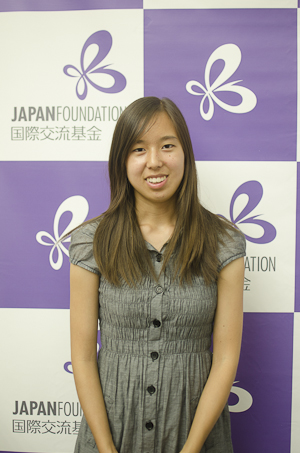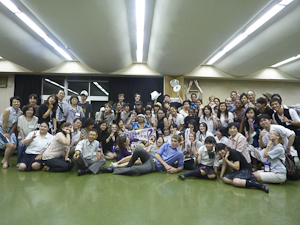

 Jenny Trieu
Jenny Trieu
Richardson High School
Richardson, TX
Growing up, I always hear stories from my parents and grandparents about war, about losing homes, friends, and family. Yet, all those words were foreign to me. Living a sheltered life, I never really understood what the word "loss" meant. Before I went to Japan, words like disaster, casualty, and victim were not in my perception of the world. However, going to Japan changed that, changing a part of me as well and showing me the true meaning behind what it means to lose something or someone and yet still be able to overcome that to see the next sunrise.
As a part of the JET MIP program, we visited Tohoku and traveled to several towns, learning about its experience and damage caused by the tsunami on March 11, 2011. During our stay, I heard a plethora of stories about people desperately looking for their loved ones, watching their homes take on flame, fire, and destruction, and in one case, even sitting in bed fearfully while the tsunami roared through their town and house. I felt their devastation, fear, and loss as I heard each story, but rising above all the sorrow I felt a strong spark of hope and determination. Despite the major setback, they never lost the direction they were heading—towards recovery. Even though each Tohoku resident lived with the memory daily, they always held a steady smile, readily greeting and welcoming us into their towns. A year has passed since their memory, however, their feelings still held strong. This strength can even be felt looking around Tohoku; where each corner and building bears signs that say "Ganbappe Tohoku!" Looking at all the signs and the smiling faces of the Tohoku people as we pass by them in greeting, Tohoku will always be a strong, united, and welcoming region of Japan to me.
Moreover, driving through Tohoku, I saw rows of houses flattened into nothing but a block of foundation. I witnessed whole areas of former cities cleared out into a green field. Everywhere we went, there was never a time I did not feel surprised or touched. In Rikuzentakata, a whole pine tree forest was washed away, leaving only one, now called the Miracle Pine Tree, standing. This Miracle Pine Tree is now a symbol to the people of Rikuzentakata, a symbol of hope and miracles. With a tour guide, we also heard stories after stories about people's flight and despair. But after each story, we were told by our tour guide not to worry too much because if we worry, the people of Tohoku would also worry for us. When he told us that, our bus fell silent instantly and his words sank into us. While sitting there listening to him, I felt all of our emotions rise simultaneously, asking the question "How can there be people in this world who have lost everything yet still worry for others who are worrying for them?" Hearing those words left me speechless, touched by how selfless and compassionate the people of Tohoku are. Ishinomaki, Sendai, and Kesennuma all held similar stories as Rikuzentakata, never failing to touch the deepest part of our hearts.
Once we returned to Osaka, I got another view of the Japanese people in their daily lives. Again, we were always welcomed by all whom we met, always giving us a smile and helping hand whenever we needed one. Despite the language barrier, we always overcame that by exchanging what we knew, learning new perspectives about the Japanese culture. My personal favorite aspect of the program was the host family preparations where we learned Osaka dialect. Learning the dialect gave me a better view through a window into the Japanese culture, showing me that there are even cultural differences within Japan. My home stay weekend was very short but a time of life that I will never forget. I met a great family who welcomed me into their home, took me to famous sites for sightseeing, and even though they do not know my own family back in the United States, they bought me gifts to bring back. There was never a time I felt alienated or alone in the family, and I thank them for that. Thanks to my home stay, I met a group of people that I can truly call my family; even though we are not related in any way, I will always see them as another extension of my friends and family. Summing up my experiences, my stay in Japan has been an unforgettable memory of my life. It opened up my eyes up to the differences in cultures, to a new way of life I only learned about in a classroom setting, and it gave me a new perspective in everything I see.
Now that I am back in America, I want to continue my studies in the Japanese language and culture in order to fulfill JET-MIP's and now my goal, of creating bonds in between the United States and Japan. After experiencing the language and culture for two weeks, my curiosity and interest in Japan has only increased and will continue to drive me to further my search of understanding the culture better. Not only do I want to learn about the culture and language, I want to better understand it, to incorporate it into my own perspective of my own culture. Because America is a blend of a myriad of cultures, I personally do not practice only one culture; my home practices a hybrid of Asian and American cultures. Because of that, I believe that each culture has their own uniqueness defining a person and their lifestyle, so I want to learn more about the Japanese culture to influence my own hybrid culture and share that with others to promote open-mindedness and strengthen America's interest in Japan and vice versa.
Once the new school year starts, I plan to share my experience with the Japanese organizations at my high school and college. Even though I have yet to give my presentation, I did bring back the many stories I heard in Tohoku to my friends and family, and having touched them, we decided that we would fundraise to help support Japan one step at a time. Our first project would be to help restore the miracle pine tree in Rikuzentakata and from there, we hope to expand from fundraising to building that bridge that would connect Japan and America by sharing and teaching the Japanese culture with others through the Japanese clubs held at our schools. Even though we are only a small part of America, we believe that each bond we create between the friends in Japan and America would add up to strengthening a whole nation's relationship. As America always says, power to the people, and if the people of America hold the bonds with the people of Japan, there will always be an unbreakable link between the two nations. This link then would set an example for nations across the globe, promoting peace and understanding, and showing other nations that even if there is a history of war between two nations; friendship can always bloom to overcome the flaws of the past. Some say that the past predicts the future, but if actions occur in the present, the past that influences the future could be changed for the better.
Thus, to Ms. Taylor Anderson and Mr. Monty Dickson, I would like to say to them thank you. Even though the two words are not enough to convey my gratefulness to them, I hope that, wherever they are, they can feel my gratitude for what they have done not only to me, but also to the people of Japan and America as well. They were not just any typical teachers, they traveled to Japan to spread the American culture and while there, they influenced countless adults and children alike in their passion to strengthen the relationship between the two nations. Without you and your dedication, Ms. Anderson and Mr. Dickson, I would not have been able to fulfill my dream of going to Japan, I would not have met so many selfless and compassionate people, and I would not have felt the strength of the Japanese people in the face of last year's devastation. Thank you both for giving me the opportunity to visit the nation that influenced me greatly to become who I am today. Thank you for standing by your dreams and creating influences that would last even beyond our times. Thanks to the example both of you have set; I will continue my dream and dedication to building that bridge, that road that would forever link America and Japan. Even though I am just one person, I will become one of the many voices that will continue to share both of your legacies.

Students and adults alike interact with the 32 American students in both English and Japanese, creating everlasting friendship.